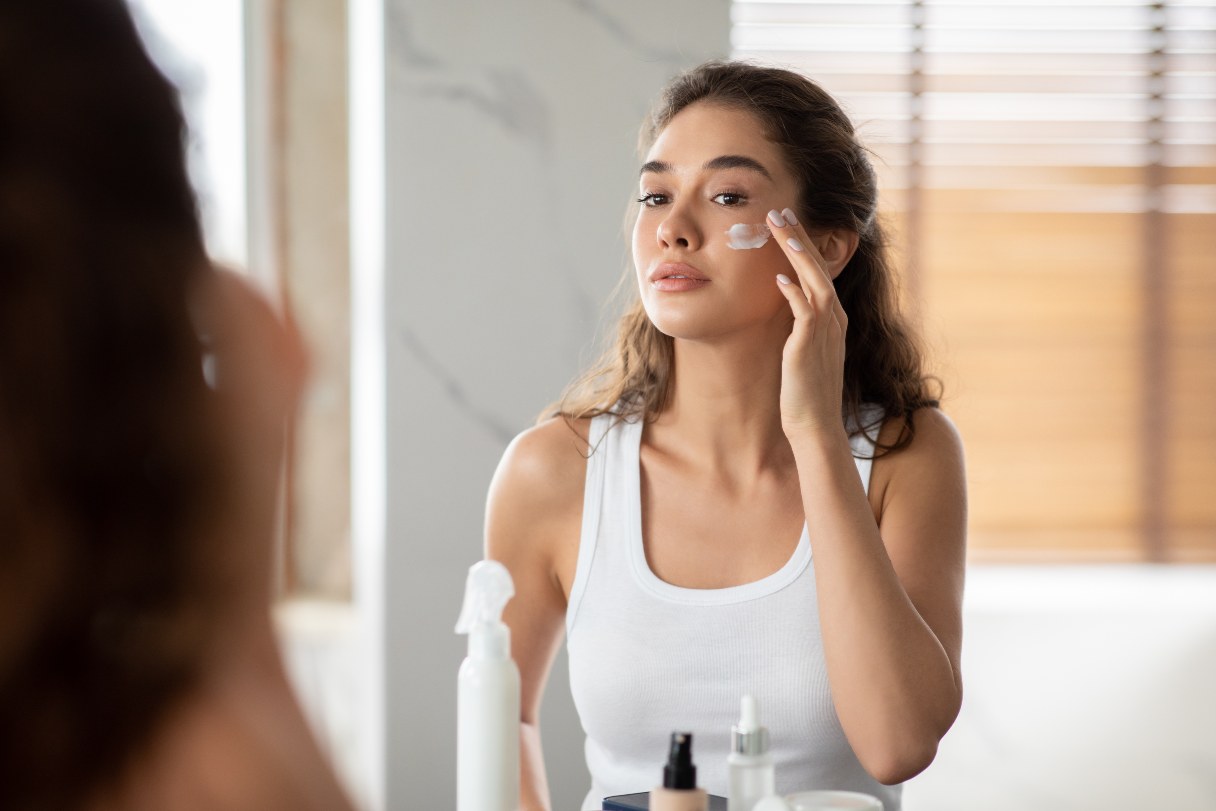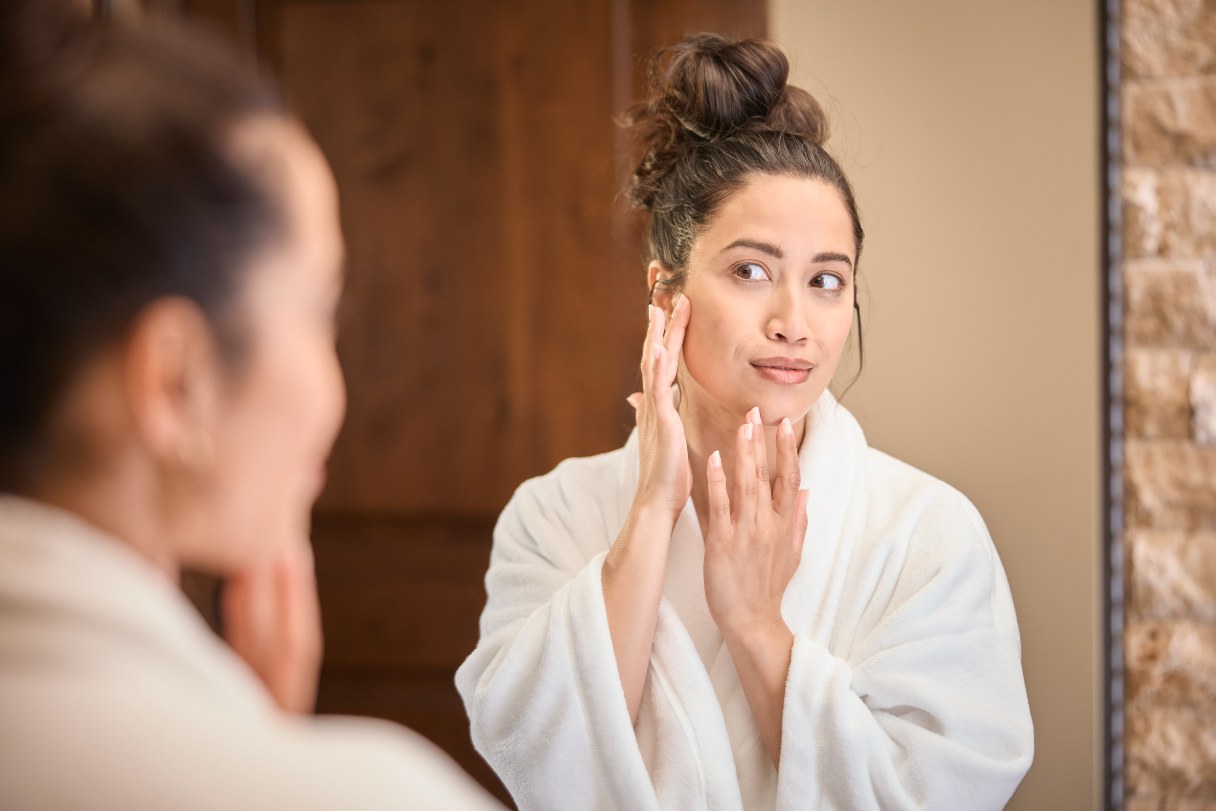It’s easy to write off skin care as just being about vanity. But taking care of your skin is important not just for healthy, beautiful skin but also for an overall healthy body.
Researchers have found that skin damage is associated with a host of concerns — such as inflammation and even cognitive decline — and skin care could protect against some of these harms from aging and disease.1 At the very least, chances are that you’ll feel and look better if you adopt a skin care routine.
How to Create a Morning Skin Care Routine
To get the best benefits from each step in your skincare routine, they should come in a certain order, according to dermatologists. You wouldn’t want to apply product to dirty skin or add a special serum on top of a moisturizer where it won’t absorb.2
While every person’s morning routine might look a little different, here are some dermatologist-recommended steps:2
-
Cleanse. Depending on your skin type, you either want to cleanse or just gently douse your skin with cool or lukewarm water. Be careful to not over-cleanse, as this might create more oil.
-
Tone. Toners are not an absolute necessity, but they can add benefits, such as helping your skin absorb other serums or remove additional oil. You want to be sure the toner doesn’t contain any drying agents (like alcohol) and that it's right for your skin type. However, your skin will likely be just fine if you skip this step.
-
Add a serum. Serums are concentrated products often designed for specific benefits, such as reducing sun or environmental damage. There are numerous types — from vitamin C serum to hyaluronic acid serum — each offering its own benefit. Consult with your skin care professional if you’re interested in adding one of these to your skin care routine.
-
Apply eye cream. If you're concerned with puffiness, skin laxity, fine lines or other eye concerns, an eye cream can be a wonderful addition to your routine.
-
Moisturize. Every skin type, even oily skin, needs a moisturizer. Exposure to sun and environmental pollutants erodes the skin’s natural oils. It’s a good idea to apply your moisturizer when the skin is still moist to help it absorb better.
-
Use sunscreen. If you plan to be in the sun at all, add sunscreen over your moisturizer or purchase moisturizers that have sunscreen built in. You want an SPF of 30 or higher to block harmful rays and — if you plan to be in any water —one that is water-resistant.3
If this feels like too many steps, you can just stick to the basics: cleanser, moisturizer and sunscreen.
How to Create an Evening Skin Care Routine
Your evening skin care routine may have slight variations from your morning routine, or you may opt to repeat the same steps. It’s really up to you and your skincare professional. Generally, you can follow this order:4
-
Cleanse. An evening cleanse is important to remove the day’s accumulated dirt and makeup from your skin.
-
Exfoliate once or twice per week. If your skin suffers from dullness or dryness, an exfoliant can help. You do need to be careful, however, that you’re using the right kind of exfoliant for your skin and avoiding coarse scrubs or harsh bristle brushes. Enzyme exfoliation can do the job without any abrasives.
-
Add serums and/or retinol. Different dermatologists may recommend different products with different effects, such as growth factors and peptides that stimulate cell and collagen growth, or retinol — a Vitamin A-based product — which stimulates collagen growth and increases cell turnover. Consult with your dermatologist or skin care professional before using these products to be sure they’re right for your skin.
-
Moisturize. After washing and applying serums, you still want to moisturize at night. Your skin care professional might recommend different morning and evening moisturizers, or you may be able to use the same one.
Understanding Different Skin Types
To build a skin care routine, most dermatologists break skin types down into four main types:5
-
Normal or balanced. If you’re one of the rare lucky ones to have this skin type, it probably means you can do just about anything to your skin and it doesn’t break out or get irritated. This skin type often has a smooth or even appearance, with small pores, and is neither dry and flaky nor shiny and oily. Balanced skin is not usually sensitive to different products.
-
Dry. This skin type runs toward dry or flaky skin, typically as a result of lower sebum (oil) production. It may have a tendency to get itchy or inflamed. It’s important to find out if your skin is truly dry or if you’re drying it out by using the wrong products. A dry skin complexion might appear dull, flaky, red or pale. There might also be cracked areas of skin. Because it lacks protective sebum, dry skin can be sensitive to some products.
-
Oily. People with this skin type may have a higher production of the skin’s sebum, producing a shiny or greasy feel or appearance. Oily skin might also have visibly bigger pores. People with oily skin may incorrectly believe they should not use any moisturizer, but skipping that important step can actually lead the skin to produce more oil.
-
Combination. This skin type may have qualities of both dry and oily skin types. Some areas might be dry and flaky while others are shiny and greasy. Combination skin can be more challenging to build a skin care routine for, as some parts of the skin may be more sensitive than others.
Tips to Choose the Best Skin Care Products for Your Skin Type
There is a massive variety of skin care products for sale, and choosing the right ones can be downright overwhelming. If you are working with a skin care professional you trust, their recommendations can help. Otherwise, if you plan to purchase them yourself, consider these suggestions:6
-
Understand your skin type.
-
Do your research on product ingredients and check out user testimonials.
-
Choose products you’re likely to use every day.
-
Recognize the time frame a product should begin working.
-
Avoid products that promise miracles.
-
Opt for products that contain sunscreen to minimize the number of products you need.
Other Ways to Care for Your Skin
There are more ways to care for your skin in addition to treating it from the outside in. Here are a few other ways you can help keep your skin healthy:
Eat a healthy diet
A balanced and nutritious diet is important for all aspects of health, and skin is no exception. Research has shown that getting proper nutrition helps keep skin healthy. Similarly, unhealthy diets — such as eating too much refined sugar or high-fat foods — can exacerbate diseases, promote aging and aggravate skin conditions such as acne.7
Get adequate sleep
Getting enough sleep is an important part of skin care, as it’s during sleep that the body engages in the repair process, skin cell regeneration and more.8
Healthy sleep can contribute to reduced stress, which in turn is linked to lower stress hormones like cortisol. Higher levels of stress hormones can contribute to inflammation, breakouts and even early aging of the skin.8
Disrupting your normal circadian rhythms may also disrupt your body’s ability to heal and regulate processes, including those that repair UV damage to the skin. With good sleep, you give your skin a solid foundation for health.8
Stay hydrated
Like a good diet, drinking enough water is important for your overall health as well as being beneficial to your skin. Good hydration can improve your skin tone by promoting its natural elasticity, smoothing out the appearance of wrinkles and fine lines and reducing puffiness. Hydration also promotes healing and may even prevent acne from getting worse. And it can help you regulate your body temperature in hot weather and reduce heat rashes.9
Manage stress
If you’ve ever had a stress breakout — a pimple that emerges after a challenging time— you know stress can affect the skin. Research shows that stress activates the endocrine, neurologic and immune systems. This can lead to the production of hormones, such as cortisol, as well as catecholamines and neuropeptides that can increase skin inflammation, impair the skin’s natural barrier and slow down wound healing. By managing your stress through whatever healthy means works for you — from counseling and meditation to exercise and biofeedback — you can help support healthy skin.10
Taking Care of Your Skin Doesn't Have to Be Complicated
Adopting a skin care routine is a great way to keep your skin healthy and radiant by delaying some of the effects of aging, sun damage and life’s wear and tear. It doesn't have to be complicated, and it can be customized to any budget or lifestyle. Think of skin care as just another way to keep your body healthy.
Financing Your Skin Care Routine With the CareCredit Credit Card
The CareCredit credit card makes it easy to pay for dermatology visits, over-the-counter treatments and prescription medications at locations within the CareCredit network.* Start enhancing your skin today and find a dermatologist near you that accepts CareCredit. Continue your wellness journey by downloading the CareCredit Mobile App to manage your account, find a provider on the go and easily access the Well U blog for more great articles, podcasts and videos.
In addition to dermatology, you can also use your CareCredit credit card for other cosmetic procedures, dentistry, pet care, vision, hearing, health systems, dermatology, pharmacy purchases, spa treatments and so much more within the CareCredit network. How will you invest in your health and wellness next?
Author Bio
Jordan Rosenfeld has been freelance writing for 21 years about finances, health, education and more. Her work has appeared in The Atlantic, The Billfold, Good Magazine, GoBanking Rates, Daily Worth, Quartz, Medical Economics, The New York Times, PayPal, The Washington Post and more.








